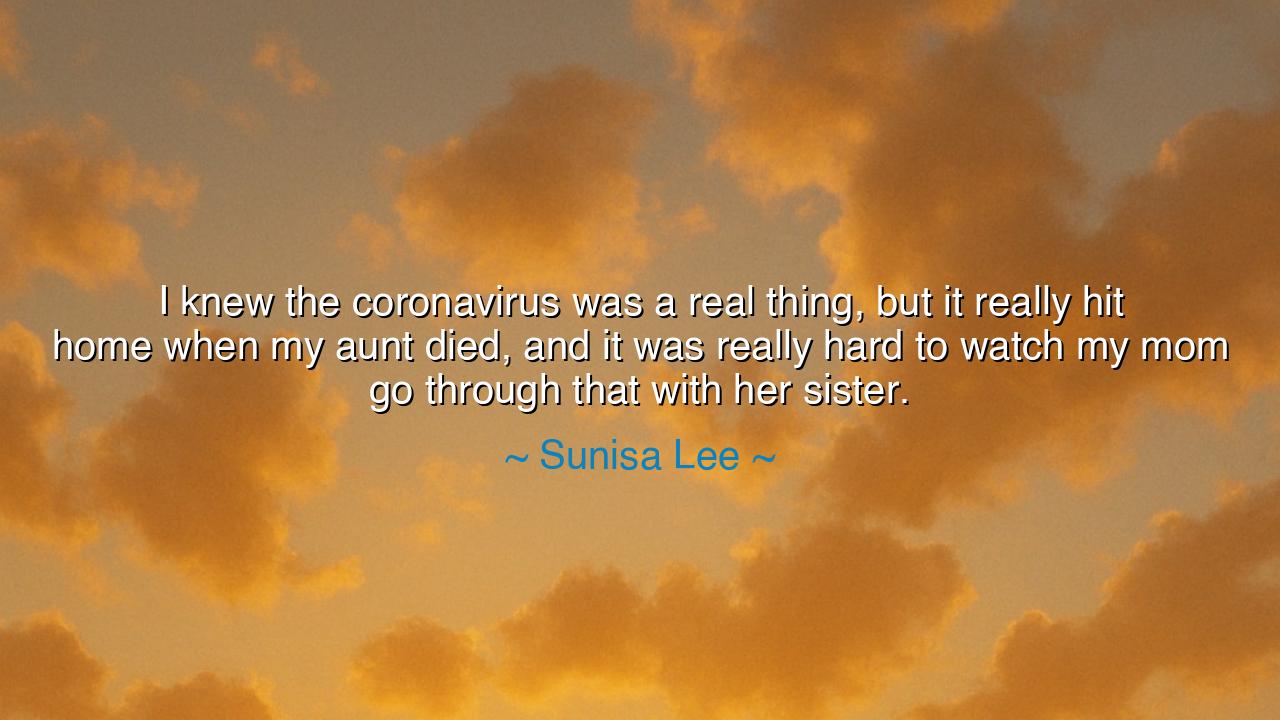
I knew the coronavirus was a real thing, but it really hit home
I knew the coronavirus was a real thing, but it really hit home when my aunt died, and it was really hard to watch my mom go through that with her sister.






When Sunisa Lee said, “I knew the coronavirus was a real thing, but it really hit home when my aunt died, and it was really hard to watch my mom go through that with her sister,” she spoke with the voice of one who has passed through the veil that separates understanding from experience. Her words are quiet, but they carry the gravity of awakening—the moment when a truth once distant becomes intimate, when the abstract becomes painfully real. This is not merely a reflection on a pandemic; it is a meditation on the nature of empathy, mortality, and connection, and on the sorrowful wisdom that only loss can teach.
To say, “It really hit home,” is to confess that knowledge of the mind is not the same as knowledge of the heart. We can live surrounded by facts, numbers, and news, yet remain untouched until grief crosses our threshold. Sunisa Lee’s realization mirrors the ancient truth that wisdom does not come through information but through experience. For just as one cannot know the sea by reading its description, one cannot understand suffering until the waves reach one’s own shore. The ancients would say that only when pain visits the home does compassion awaken fully, for the heart must be wounded before it can learn to feel deeply for others.
The story of Job in the sacred texts speaks of a man who knew this same transformation. Surrounded by fortune, he acknowledged suffering as a concept, but only when all that he loved was taken did his faith and understanding deepen. His lament was not weakness—it was revelation. Like Job, Lee’s words remind us that the greatest trials often come not to destroy us, but to expand our humanity. To witness her mother’s sorrow for a lost sister was to stand in the fire of shared pain, to see that grief is not solitary, but woven between generations, between hearts that beat as one.
There is also in her statement a portrait of filial love—the pain of watching a parent suffer. Few burdens are heavier than the helplessness of seeing someone who once protected us now bowed by grief. In that moment, a child becomes the caretaker of the parent’s heart. This exchange, ancient and sacred, binds families through time. When Lee says, “it was hard to watch my mom go through that,” she speaks for countless souls who have learned that love’s greatest test is not celebration, but endurance—standing beside those we cherish when the light fades and the world feels unbearably heavy.
Her words also unveil a collective truth: that the pandemic, for all its scale, became truly real only through personal loss. Humanity, scattered and frightened, was united not by statistics but by the shared ache of mourning. Each loss became a thread in a global tapestry of grief. From one household to another, from one nation to the next, we learned that suffering knows no borders, that fragility is the common language of all humankind. Sunisa Lee’s story, though deeply personal, reflects this universal transformation—how tragedy turned strangers into kin through the shared recognition of mortality.
Yet from this pain arises a deeper wisdom, one known to the philosophers and poets of every age: that mortality awakens meaning. When we lose, we remember how precious it is to love; when we grieve, we learn to cherish the living. The ancients taught that death is not merely the end of life, but the teacher of the living. To be confronted with loss is to be reminded that time is sacred, that kindness must not be postponed, and that every word of love unspoken is a candle unlit. Thus, Lee’s words, born of sorrow, become a call to presence—to hold close those we still have, and to live with gentleness, for the next dawn is never guaranteed.
So let her experience be not only a story of grief, but a lesson for all who live after her. When tragedy “hits home,” do not turn away from it. Let it deepen your compassion, strengthen your gratitude, and remind you of the delicate thread that binds every life. Reach out to those who suffer, for their pain could one day be your own. Speak love while you have breath, and hold your family not only in your hands but in your heart. For as Sunisa Lee teaches through her tears and her truth, loss, though cruel, can also be the forge in which the human spirit is purified—and from it, the light of understanding can rise again.






AAdministratorAdministrator
Welcome, honored guests. Please leave a comment, we will respond soon